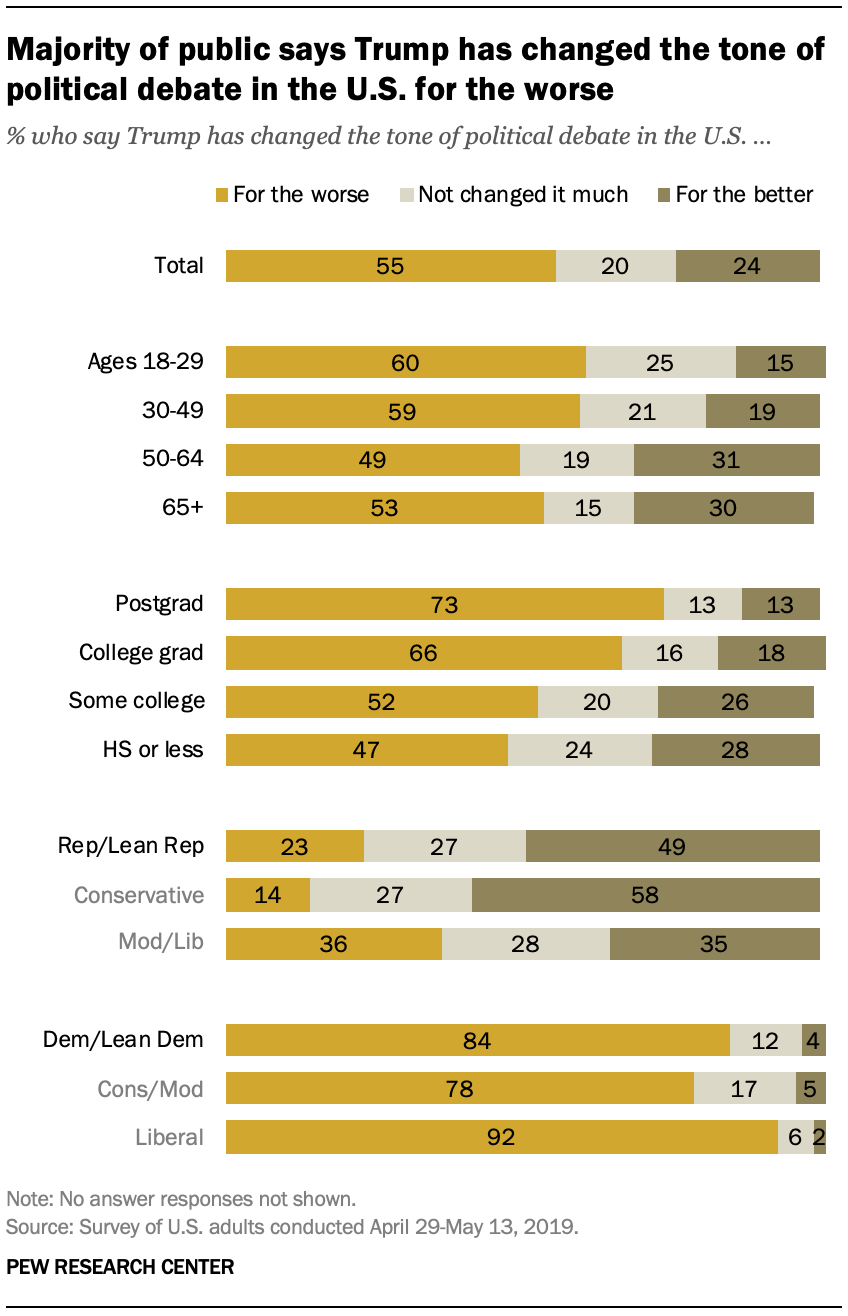 A majority of Americans say that Donald Trump has had a negative impact on the tone of political debate in the United States.
A majority of Americans say that Donald Trump has had a negative impact on the tone of political debate in the United States.
Overall, 55% say that Trump has changed the tone and nature of political debate in the U.S. for the worse since entering politics; fewer than half as many (24%) say he has changed it for the better, and 20% say he has not changed it much either way.
Democrats overwhelmingly say Trump has changed the tone of political debate for the worse. More than eight-in-ten Democrats and Democratic leaners (84%) say Trump has had a negative effect on political debate in this country, including 92% of liberal Democrats and 78% of conservative and moderate Democrats.
Republicans and Republican leaners are more divided in their views: 49% say Trump has changed the tone of the debate for the better, while 23% say he has changed it for the worse and 27% say he hasn’t changed it much either way. A majority of conservative Republicans (58%) think Trump has changed the tone of political debate for the better, compared with 35% of moderate and liberal Republicans.
Aside from the partisan differences on this question, there are significant divides by age and education. Those with higher levels of education are much more likely than those with lower levels to say that Trump has changed the tone of political debate for the worse. For instance, 73% of postgraduates say this compared with 47% of those with no college experience.
And adults younger than 50 (59%) are more likely than those 50 and older (51%) to say that Trump’s impact on the tone of political debate in the U.S. has been negative.
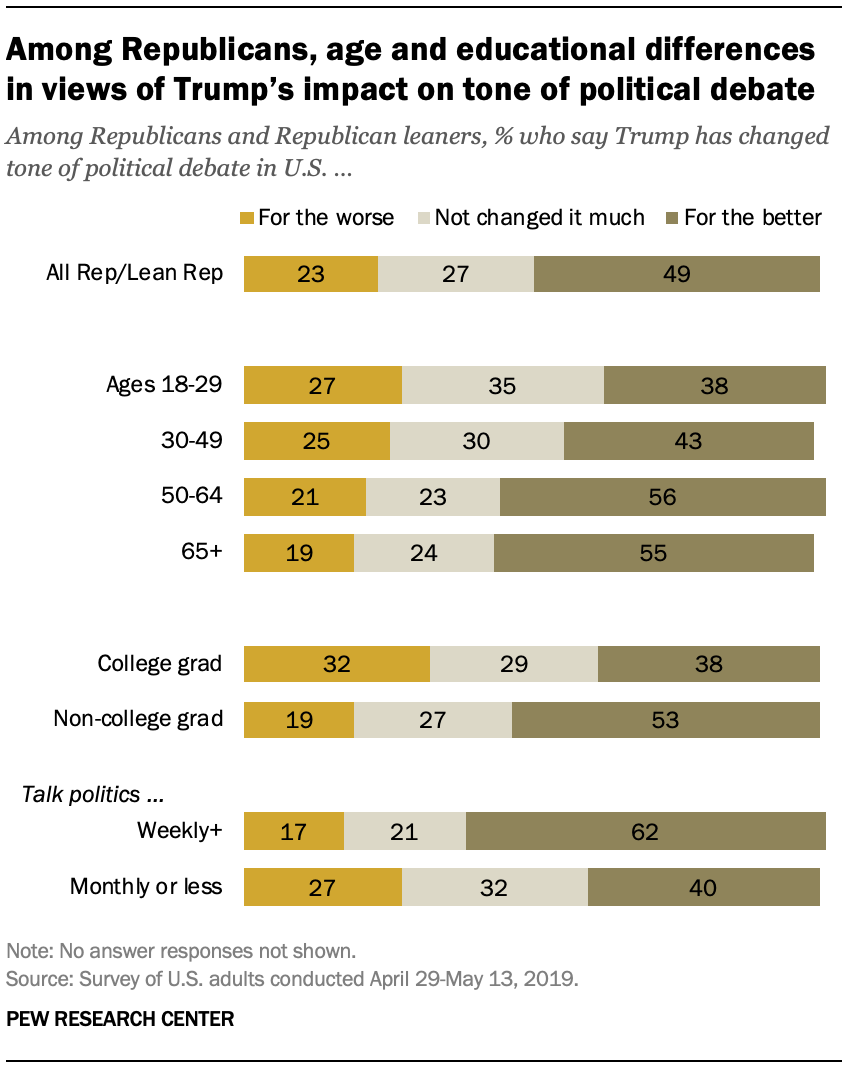 The differences among Republicans over Trump’s impact on the tone of political debate extend beyond ideology.
The differences among Republicans over Trump’s impact on the tone of political debate extend beyond ideology.
Among Republicans and Republican leaners, older adults and those without a college degree are significantly more likely than younger adults and those with a college degree to say Trump has changed the tone of political debate in the country for the better.
In addition, Republicans who say they talk about politics with others at least weekly are much more likely than those who talk politics less often to say Trump’s impact on debate has been a positive one (62% vs. 40%).
Majorities say Trump’s comments elicit concern, exhaustion, confusion
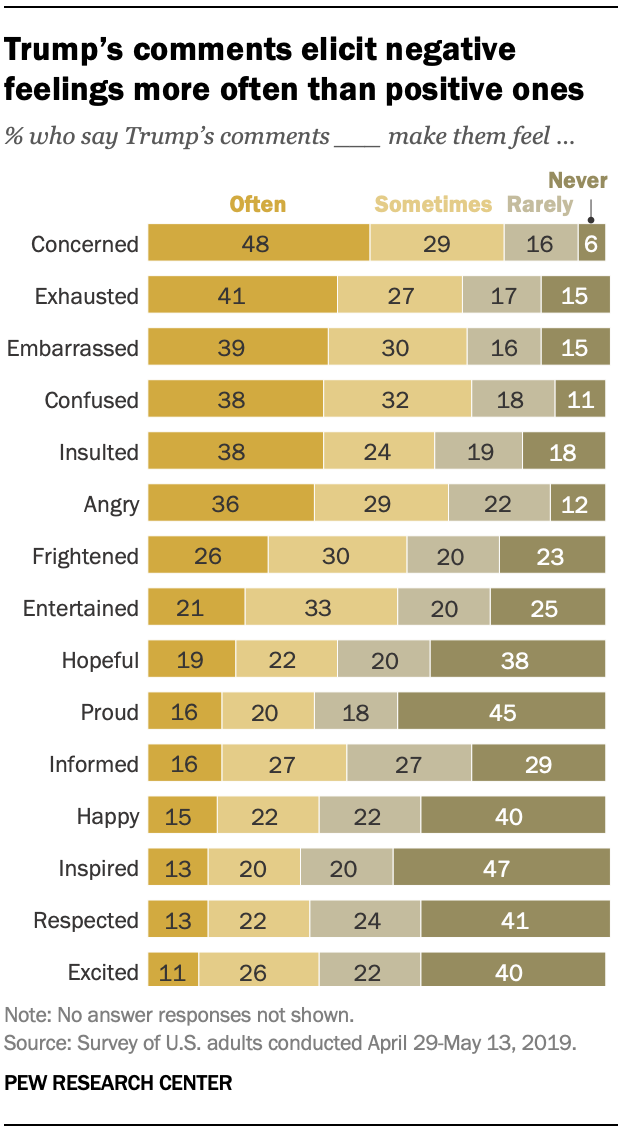 When asked about their reactions to the things Trump says, the public reports experiencing negative reactions more frequently than positive ones.
When asked about their reactions to the things Trump says, the public reports experiencing negative reactions more frequently than positive ones.
Out of a list of 15 possible reactions, “concerned” is the most frequently reported reaction to Trump’s comments. Overall, 76% say Trump’s comments often (48%) or sometimes (29%) make them feel concerned. Relatively few say Trump’s comments rarely (16%) or never (6%) make them feel concerned.
Other negative emotions also are widely experienced in response to Trump’s comments, including confusion (70% say this happens often or sometimes), embarrassment (69%), exhaustion (67%) and anger (65%).
Feeling entertained is the most frequent positive reaction to Trump’s comments: 54% say they often (21%) or sometimes (33%) feel entertained by what Trump says.
Fewer than half say Trump’s rhetoric at least sometimes makes them feel informed (43%), hopeful (41%), happy (37%), proud (36%) and other positive sentiments.
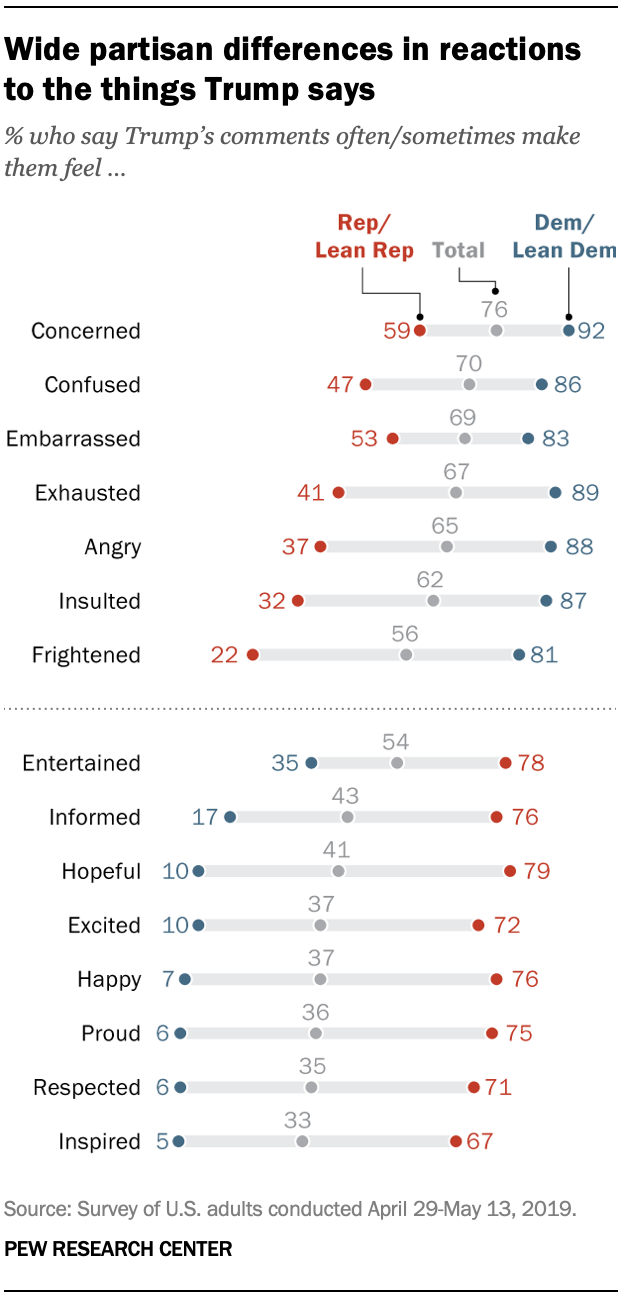 Large majorities of Democrats and Democratic leaners report that Trump’s comments at least sometimes make them feel each of the seven negative emotions asked about in the survey. For example, 92% say they often or sometimes feel concerned by what Trump says and 89% often or sometimes feel exhausted by his rhetoric.
Large majorities of Democrats and Democratic leaners report that Trump’s comments at least sometimes make them feel each of the seven negative emotions asked about in the survey. For example, 92% say they often or sometimes feel concerned by what Trump says and 89% often or sometimes feel exhausted by his rhetoric.
Conversely, majorities of Republicans and Republican leaners say they at least sometimes experience each of the eight positive emotions included in the survey in response to the things Trump says.
However, emotional reactions to Trump’s rhetoric among Republicans and Democrats are not entirely parallel, with Democrats somewhat more likely to say they have negative reactions than Republicans are to say they have positive ones.
For instance, across the seven negative items, an average of 87% of Democrats say they often or sometimes feel this way because of Trump’s comments. Across the eight positive items, an average of 74% of Republicans say they often or sometimes feel this.
In addition, significant shares of Republicans say Trump’s comments make them feel negative emotions, at least sometimes. Overall, 59% of Republicans say the things Trump says often or sometimes make them feel concerned, 53% say his comments make them feel embarrassed and 47% say they feel confused. About a third of Republicans (32%) say they feel insulted by Trump’s rhetoric, at least sometimes.
By contrast, relatively small shares of Democrats report feeling positive emotions in reaction to what Trump says. While 35% of Democrats say Trump’s comments often or sometimes make them feel entertained, fewer than two-in-ten say they often or sometimes experience any of the other positive emotions.
Public says elected officials should avoid use of heated language
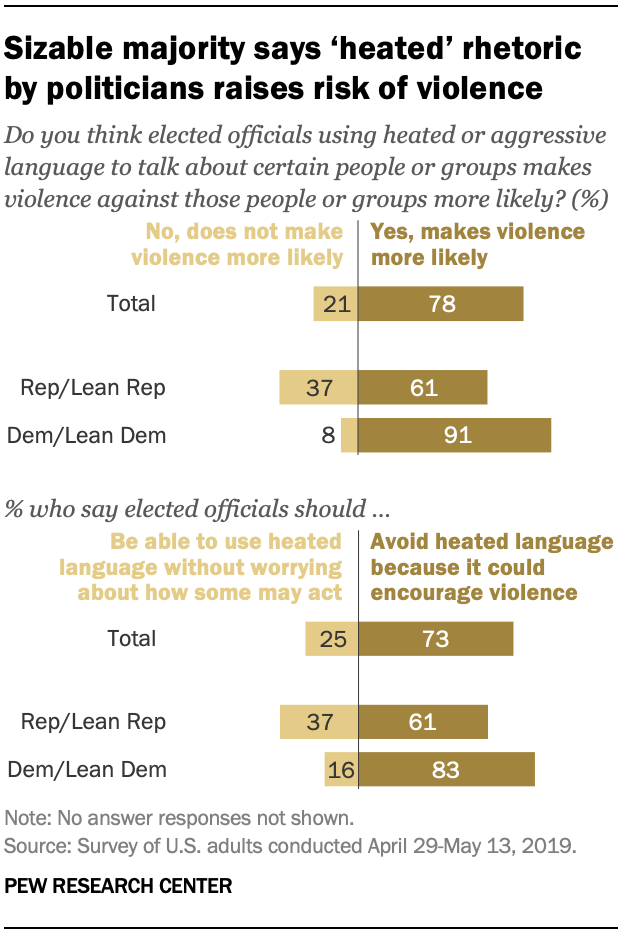 Americans believe there is a link between elected officials’ use of heated or aggressive rhetoric and the possibility of violence against people and groups, and there is broad agreement that officials should avoid this type of language.
Americans believe there is a link between elected officials’ use of heated or aggressive rhetoric and the possibility of violence against people and groups, and there is broad agreement that officials should avoid this type of language.
About eight-in-ten (78%) say that elected officials using heated or aggressive language to talk about certain people or groups makes violence against those people or groups more likely; far fewer (21%) say this type of language does not make violence more likely.
Majorities in both parties say there is a connection between the language officials use to talk about certain groups and the possibility of violence, but this view is more widely held among Democrats and Democratic leaners (91%) than among Republicans and Republican leaners (61%).
Consistent with this view, 73% of the public says elected officials should avoid heated or aggressive language because it could encourage some people to take violent action; 25% say that elected officials should be able to use heated or aggressive language to express themselves without worrying about whether some people may act on what they say. Among Democrats, 83% say elected officials should avoid the use of heated language because of the possibility that it could encourage violence; a narrower majority of Republicans (61%) also take this view.
Honesty, knowledge highly valued in elected officials; narrower majorities say respect, willingness to compromise are very important
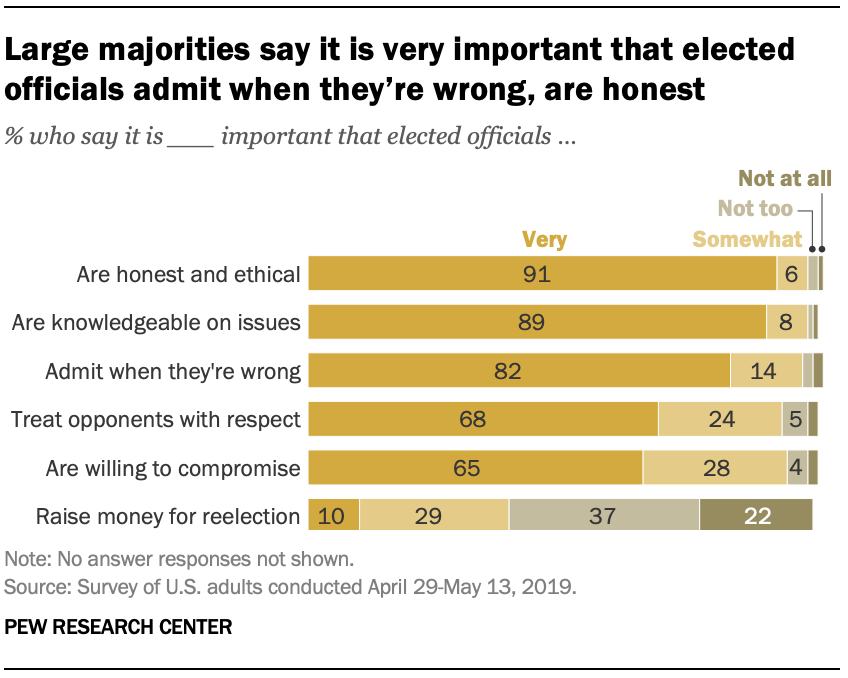 There is widespread agreement among the public that it is very important for elected officials to be honest and ethical (91%), to be knowledgeable on the issues (89%) and to admit when they are wrong (82%).
There is widespread agreement among the public that it is very important for elected officials to be honest and ethical (91%), to be knowledgeable on the issues (89%) and to admit when they are wrong (82%).
Roughly two-thirds say it is very important for elected officials to treat opponents with respect (68%) and to be willing to compromise with them (65%).
Among six traits included in the survey, only one – spending time raising money for reelection – is not identified as a valued trait for elected officials. Just 10% say it is very important that elected officials spend time raising money for reelection; 29% say this is somewhat important while a majority (59%) say this is not too or not at all important.
Some traits, such as honesty, are seen as universally important for elected officials across different contexts. However, views of the importance of other traits – notably, willingness to compromise with opponents and treating them with respect – vary depending on one’s own partisan affiliation and the party of the elected official.
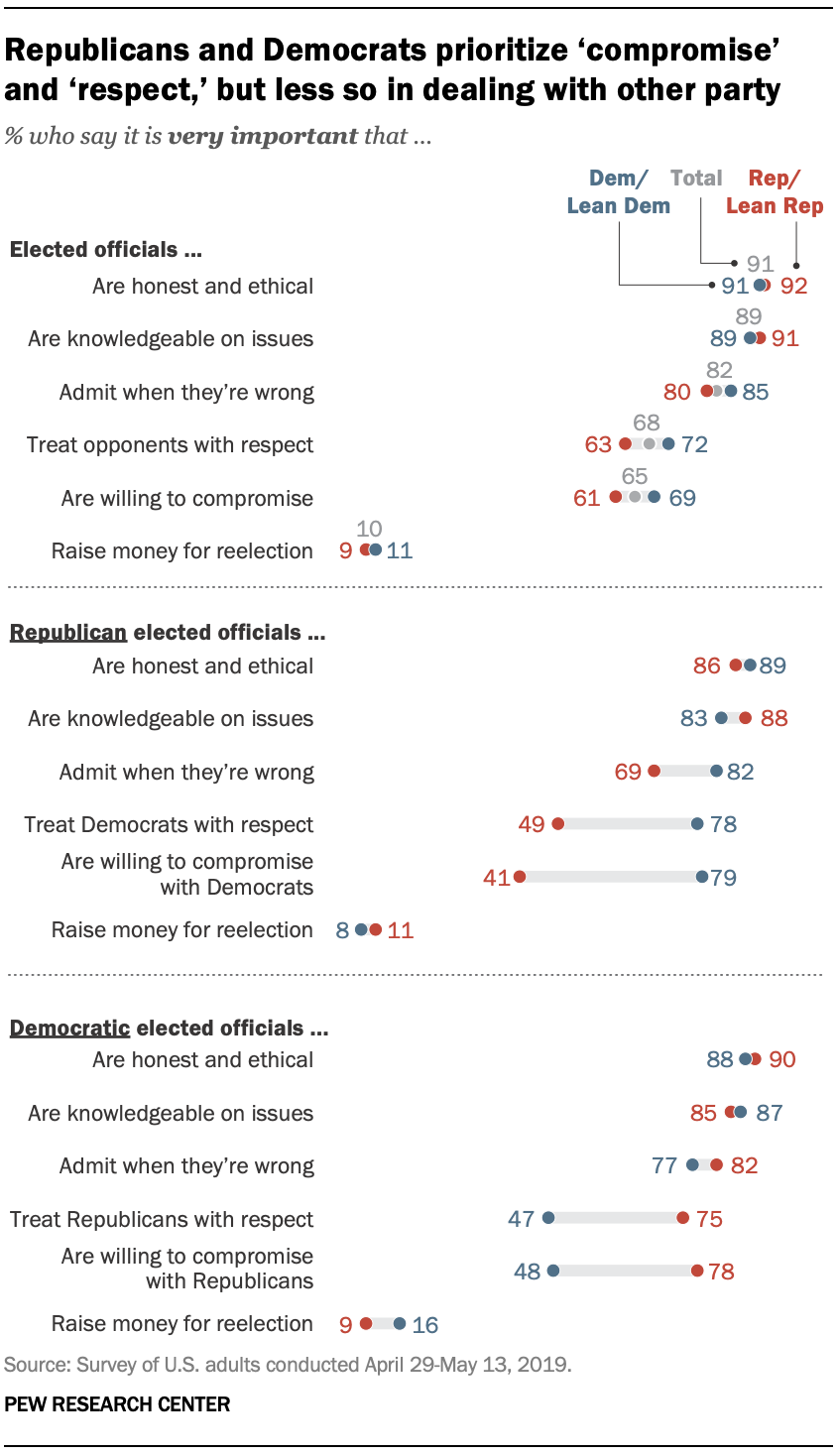 Among Americans overall, 68% say it is very important for elected officials to treat their political opponents with respect. Democrats (72%) are somewhat more likely than Republicans (63%) to highly value politicians treating opponents with respect. Similarly, there is a modest partisan divide between the shares of Democrats (69%) and Republicans (61%) who say it is very important for elected officials to be willing to compromise with their political opponents.
Among Americans overall, 68% say it is very important for elected officials to treat their political opponents with respect. Democrats (72%) are somewhat more likely than Republicans (63%) to highly value politicians treating opponents with respect. Similarly, there is a modest partisan divide between the shares of Democrats (69%) and Republicans (61%) who say it is very important for elected officials to be willing to compromise with their political opponents.
There are much more pronounced partisan gaps when respondents are asked specifically about Republican and Democratic elected officials.
Both Republicans and Democrats are far more likely to say it’s very important for the other party’s elected officials to be willing to compromise and to treat opponents with respect than it is for their own party’s elected officials to behave this way.
Nearly eight-in-ten Democrats say it is very important for Republican elected officials to be willing to compromise with Democrats (79%) and to treat Democratic elected officials with respect (78%). However, far fewer value these behaviors when asked about their own party’s elected officials: Just 48% of Democrats say it is very important for Democratic elected officials to be willing to compromise with Republicans, and 47% say the same about Democratic officials treating Republican officials with respect.
A similar dynamic is seen among Republicans. While 78% of Republicans say it is very important for Democratic elected officials to be willing to compromise with Republicans, only 41% feel it is very important for members of their own party be open to compromise with Democrats. Similarly, Republicans are far more likely to say Democratic officials should treat their Republican opponents with respect (75%) than to say Republican elected officials should be respectful toward their Democratic opponents (49%).


 Views about the acceptability of political insults
Views about the acceptability of political insults Across the Table: Would you share your views of Trump over dinner?
Across the Table: Would you share your views of Trump over dinner?